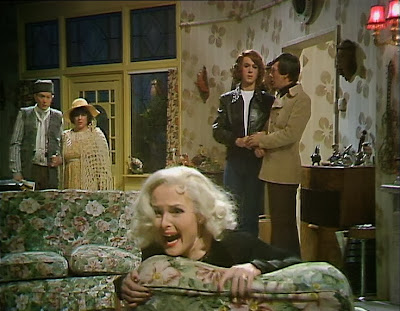~~~
Having
joined the army for his love of kayaking, a painfully ignorant 18-year-old
(Kevin McNally) struggles to adapt to his new way of life, patrolling the
streets of a troubled Northern Irish city, and soon comes to find himself
obsessed with the idea of paradise. His young commanding officer (Ian
Charleson), sickened by his generation’s morose morality, and haunted by his time
in Africa, soon comes to think likewise, in Brenton’s intriguing teleplay. A
terrifying dream sequence – directed by Roger Woodburn rather than Michael
Apted – proves its highlight, but corrosive dialogue and a bold use of sound
and voiceover also play their part.
A
flat cap-sporting secretarial temp (Anthony Douse), who suffers through the
behaviour of his cold, cheating wife (Sheila Gish) answers the life-swapping ad
of a vegan keep fit fanatic (Peter Egan), who has a warm, culinarily doting
other half (Miriam Margolyes). Inevitably, and before too long, wives, lovers,
and identities come crashing together, in Roger McGough’s sporadically
entertaining but largely tiresome piece of satirical absurdism. That said, its
boldness of plot and style should be applauded, and its performances –
particularly Egan’s committed turn – prove effective.
Whilst
his stepdad (Sonny Caldinez) wishes him to become a professional wrestler just like him (and, indeed, just like the boy’s late father), his mother (Jill Gascoine) wants him to
become a draughtsman. However, 16-year-old Otis (Elvis Payne) has his sights
set firmly on a career in football – an ambition seemingly supported only by his new
school coach (Richard Ireson). But a life of crime seems an increasingly likely
alternative, in Glover’s authentic-feeling if perhaps rather bland teleplay.
In
the hope of cheering her up – ostensibly, at least – a decidedly immature
21-year-old university student (Mick Ford) takes his recently single sister
(Deborah Norton) on a night out in their lifeless home town. Before long, they
are (failing) to eat in a greasy spoon caf’, befriending a slightly dopey
waitress (Lynne Miller), exploring a shopping precinct, and attending a rather
naff disco. All the while, an incestuous tension builds between the two.
Well-crafted with good performances (Ford’s angry young man is particularly
noteworthy), Poliakoff’s intense nocturnal drama proves decidedly gripping.
Taking
advantage of his trainer’s (Ernie Claydon) absence, a ruthless promoter (Peter
Spraggon) convinces a hard-working but rather naïve young boxer (Bill Buffery)
to fight against a local champion (Paul Davis) – and at just two days’ notice
to boot. His fiancée (Gillian Taylforth), who’d rather be out dancing, isn’t
all that keen on the idea, whilst his parents (Maria Charles & Frederick
Radley), who’ve seldom shown any concern for his vocation, are only really
interested in any potential financial boon. His brother (Stephen Bill) is,
perhaps, more supportive. But in the end he is forced to face his big break all
alone, in Roy Minton’s viscerally matter-of-fact pugilistic drama. Provocative
scripting and noteworthy direction (from Alan Clarke) combine to quietly
powerful effect.
Six
years after giving up custody to her sister (Carole Nimmons), a suburban
housewife (Ann Pennington) is reunited with her nine-year-old son (David Max
Vaughan). However, her new husband’s (Dinsdale Landen) bullying, abusive ways –
not to mention her own parenting inexperience – soon lead to a very unhappy
household and en even unhappier little boy, in this almost unbearably
harrowing, intensely visceral domestic drama. Brilliantly directed by Philip
Saville and featuring an astonishingly terrifying performance from Landen,
Shuttlecock proves – to say the least – a quite remarkable piece of television.







